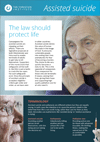Two elderly cancer patients in Scotland plan to end their lives in a Swiss suicide clinic within weeks of each other.
Both men, one in his 90s, are registered at a Glasgow-based organisation which vets clients for two assisted suicide clinics in Switzerland.
The organisation, Friends at the End, was founded by retired GP Libby Wilson. It has already been involved in helping two other Scots prematurely end their lives.
Dr Wilson said: “Both men are actively seeking to die. If their condition is clear-cut the whole process will take between six weeks and three months.”
The news comes just days after Sky screened the assisted suicide of Craig Ewert in the Swiss suicide clinic, Dignitas. The parents of a rugby player, paralysed by injury, were not prosecuted for assisting in his death in the same clinic.
MSP Margo MacDonald, who recently put forward a member’s Bill on assisted suicide in Scotland, sparked controversy after suggesting it was “inhumane” that people had to travel to Switzerland to “cut short their lives”.
The British Medical Association (BMA) is against legalising assisted suicide.
Dr George Fernie of the BMA said: “The BMA would be very disappointed if we ended up with having legalised physician-assisted suicide in Scotland.”
He added: “People when they have a debilitating illness that may end their life are extremely vulnerable, they’re at a fragile stage.
“And our worry is they’re going to contemplate ending their life when that really isn’t their wish.”
Dr David Jeffrey, a leading end-of-life care specialist, warned earlier this year that making assisted suicide legal in the UK would kill patient trust.
He said that while articulate patients were lobbying for a change in the law, he was concerned about vulnerable people “who don’t know where to turn and who feel they are a burden.”
Mr Jeffrey added: “The law has to protect them.”
Dr Peter Saunders of the pro-life group Care Not Killing alliance said: “The danger is that we start to believe in a story that there is such a thing as a life not worth living.
“A change in the law would put pressure on vulnerable people to end their lives so as not to be a burden.”
“You just don’t know what will happen”
In his book Against Physician Assisted Suicide, Dr Jeffrey tells the story of a former army instructor who was being treated for terminal cancer and was determined to commit suicide.
After a discussion with the doctor, it emerged that he was missing the Army, and was subsequently taken to watch a passing-out parade of young recruits, where a party had been arranged in his honour.
“His life was transformed,” Dr Jeffrey said. “He had a purpose and his demeanour completely changed. He died two weeks later, comfortably. People’s lives always have that potential. Even in the midst of suffering there can be change.
“You just don’t know what will happen.”
“A different life”
The Times recently reported the story of Matt Hampson, a former rugby player who was paralysed from the neck down during training and now requires a ventilator to breathe.
With the help of carers and a custom-built house, he has been able to set up a website, is writing an autobiography and is the patron of a charity for disabled children called Special Effects.
He says: “I don’t live a bad life, I live a different life. I use my brain more than my brawn now. It has helped me become a more rounded person. I think about things more.
“I’ve had to grow up quite a bit and do things that most 23-year-olds don’t do.”
“I’m grateful I wasn’t allowed to end it all!”
Alison Davis is National Co-ordinator of No Less Human.
She was born with severe spina bifida, and is dependent on a wheelchair. She is often in extreme pain for hours at a time. She says that for many years she wanted to “end it all”.
“If euthanasia had been legal, I would certainly have requested it and I wouldn’t be here now,” she says.
But after several serious suicide attempts, blocked by the intervention of Alison’s friends, she began to change her mind.
Alison met the disabled children she had been sponsoring through a charity. The experience led her to think, for the first time in over ten years, “I think I want to live”.
She says: “I’ll always be grateful to the friends who saved my life (though I wasn’t at the time). And I’m especially thankful there was no possibility of persuading my doctors to legally help me die.”
She believes that disabled people “deserve the same kind of help routinely given to those who do not have a physical condition but who feel suicidal”.


